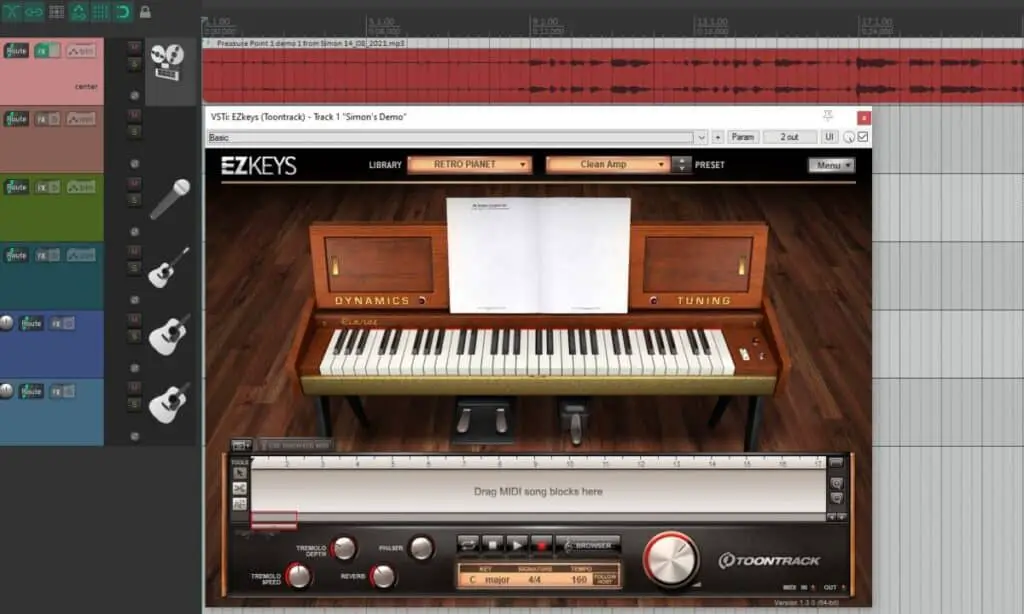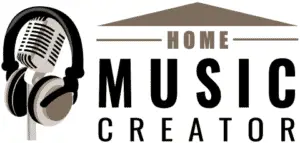DISCLOSURE: This post contains affiliate links. If you buy through these links, I may earn a small commission.

When I first switched to using Reaper as my DAW a few years ago, there were several virtual instruments that I used in my previous DAW. Would I be able to find equivalent instruments that I could use as alternatives inside Reaper?
Reaper does not have built-in instruments. It has very basic synth and sampler plugins, but these are not full-featured instruments like those in Cubase, Logic Pro, Pro Tools and similar DAWs. However, there are many freeware instruments available that work very well as plugins inside Reaper.
Although Reaper does not have its own virtual instruments, this does not stop it from being used as a platform for virtual instruments. All the major commercial instruments work well within it. In addition, there are many excellent freeware instruments available for no cost that can be used with Reaper.
If you are interested in checking out the best recording gear such as audio interfaces, studio monitor speakers, microphones, etc., you can find them at Amazon by clicking here.
What plugins come with Reaper?
As far as virtual instruments go, there is just a very basic synth (ReaSynth) and a very basic sampler (ReaSamplOmatic5000). To be honest, if you are looking for virtual instruments, these are not what you want. There are much easier-to-use freeware synths and samplers available.
Reaper does not have anything like the instruments found in the big, expensive commercial DAWs. Think Groove Agent (drums) in Cubase, Vintage B3, Clav and Electric Piano in Logic, and Air Xpand!2 multitimbral synth in Pro-Tools.
You may think this is an oversight by Cockos (the company that develops Reaper). However, I believe it is a quite deliberate decision.
Reaper is very low priced compared to the other big commercial DAWs. Development costs, therefore, need to be kept low and focused on the main product. Not developing or paying for big, complex virtual instruments is one of the reasons Cockos can keep the development costs of Reaper, and hence its price so low.
If you are considering Reaper as your DAW, definitely check out my is reaper a good DAW for beginners article.
Does Reaper have built-in effects?
Reaper comes with many effects plugins. They cover the most commonly used DAW effects; compression, EQ, reverb, delay, pitch correction, and many more. Reaper’s plugins have a very good reputation as high-performance effects that are light on system resources.
Some of the effects in Reaper are actually freely available as a separate, standalone download. These effects can then be used in other DAWs. This suite of effects is called ReaPlugs.
Reaper ships with all the effects in ReaPlugs, plus many more. The more commonly used ones include…
- ReaComp (compression)
- ReaEQ (EQ)
- ReaDelay (Delay)
- ReaVerbate (Reverb)
- ReaTune (pitch correction & tuning)
The reverb plugin in particular is used a lot. That’s why I have written a whole beginner’s guide to reverb in Reaper. I highly recommend checking it out if are a relative Reaper novice and want to improve the sound of your tracks with this classic effect.
All the effects in Reaper can be accessed by clicking on the FX button for a track, then clicking the Add button. This will give you a complete list of all the available plugins accessible by Reaper.

You are probably reading this article as you are investigating Reaper, maybe with a view to using it as your DAW. If so, I highly recommend these other articles that answer questions commonly asked by newcomers to Reaper…
- How much does Reaper cost? What happens if you don’t pay?
- Does Reaper have amp sims?
- Is Reaper a good DAW, suitable for professional use?
Where can you find VST Instruments for Reaper?
Reaper may not have its own instruments, but there are many excellent free instruments available that are ideal for use with it. If you Google for whatever instrument you are looking for (e.g. “free piano vst instrument”), you are sure to see many results. N.B: VST is the virtual instrument technology (created by Steinberg) that Reaper uses, similar to many other DAWs.
Here are a few examples of free virtual instruments ideal for Reaper…
- Upright Piano
- MT Power Drum Kit 2
- Ample Bass P Lite 2
- CollaB3 (Hammond B3 Organ)
- Sampletank CS (Sound module/Rompler)
- Orpheus (Synth strings)
- Swamp (Wavetable synth)
Additionally, these are excellent websites to discover free virtual instruments to use with Reaper…
Although not virtual instruments, amp sims (electric guitar amplifier simulators) are another extremely popular category of plugin. You guessed it – there are many free ones available. Here are a couple of the more popular ones that can be used with Reaper…
If you are interested in using amp sims in Reaper, then you are almost certainly thinking about using it to record guitars. I have written a whole guide on how to use Reaper to record guitars. Definitely check it out to learn a simple, repeatable process for recording any type of guitar using Reaper.
How to install 3rd party plugins in Reaper
Sometimes when you download a plugin, they come with an installer. If this is the case, the plugin will be very easy to install; just run like you would any other installer. i.e. double-click the .exe or .msi file and follow the on-screen instructions. This should automatically place the plugin in a place Reaper can access.
Other times there will not be an installer in the download. You will have to copy a .dll or .vst file into one of the folders in Reaper’s plugin paths.
You can find out what these folders are by going to Options->Preferences…, then selecting Plug-ins->VST. The VST Plugin Paths are at the top of the dialog.

Copy the plugin file into one of the folders specified. You may have to restart Reaper for it to show up in the plugins list.
If you happen to be interested in learning how to use a DAW, hold up for just a bit. I wrote an article about the best way to learn a DAW that I encourage you to read!
Does Reaper have built-in drums?
Reaper does not have built-in drums. However, the popular commercial drum plugins such as EZDrummer and Superior Drummer work very well inside Reaper. There are also many compatible free drum plugins available from websites such as plugins4free.com.
Does Reaper have a synthesizer?
Reaper only has a very basic synth (ReaSynth), which is probably not what you are looking for. There are many freeware VST instrument synths available that work well with Reaper, which are more similar to those shipped with other DAWs. plugins4free.com is a good source for these.
Does Reaper have a tuner?
Reaper has a tuner built-in called ReaTune. It is a pitch correction plugin, but it also has a tuning mode, in which it functions as a chromatic tuner. To use it, enable input monitoring and arm for recording the track that the instrument you want to tune is connected to.
Related articles
Before you go, if you have been using Reaper for a little while you may be interested in how to perform some common tasks. These are often asked about by novice Reaper users, so they are recommended to improve your knowledge and help you get the best out of Reaper…
- Reaper – how to improve performance
- How to import an mp3 file into Reaper
- How to save a mixdown in Reaper
Here is some of my favorite home studio gear…
Thanks for reading this article. I hope you found it helpful in your home music-making activities. Here are a few of the tools that I personally use in my home studio. These are affiliate links, so if you decide to use any of them I’ll earn a small commission.
Audio interface: My personal choice for audio interfaces are the Focusrite Scarlett series. I have been using these for years, and they have always given me great-sounding recordings. For a very reasonable price from Amazon you can buy the excellent Focusrite Scarlett 4i4, or if you don’t need MIDI capability the Focusrite Solo is a great choice.
Amp sim: Guitar amplifier simulator software has come on leaps and bounds in recent years, such that I record all my electric guitar parts using amp sims these days. One of the very best is the incredible Amplitube from IK Multimedia, which I have used on many of my songs.
Headphones for recording: My favorite headphones for recording are the Sony MDR-7506s, which I use for monitoring during all my recording sessions. They can also be found in many pro recording studios. Get the Sony MDR-7506 headphones from Amazon here.
General-purpose microphone: You can’t go wrong with a good ol’ Shure SM-57, one of the most versatile and ubiquitous microphones around. I’ve been using one in my home studio for as long as I can remember. Amazon offers the Shure SM-57 for a very competitive price.
To see all of my most up-to-date recommendations, check out this resource I made for you!


